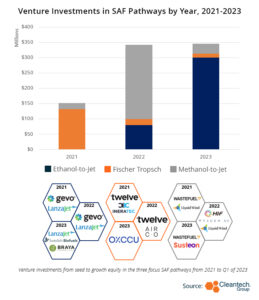San Francisco, CA – 22 June 2023 — Sustainable aviation fuels (SAF) are poised to claim 67- 88% of all jet fuel by 2050, on the strength of sustained innovation and investments and policy support, according to a report from Cleantech Group.
One SAF type called eJet, with a neutral carbon footprint, could itself account for a majority of fuel used to fly airplanes across the world by 2050, the firm’s researchers said. eJet is a drop-in aviation fuel, meaning it can be used in existing aircraft without any changes to the fuel or aircraft. eJet includes fuels generated from renewable energy, and carbon captured from the air.
Production methods for eJet include Alcohol-to-Jet (AtJ) and the Power-to-Liquids (PtL) pathway using an advanced technology called Fischer-Tropsch conversion, carbon dioxide capture techniques — such as point source capture and direct air carbon capture — and multiple forms of renewable electricity. New innovations in production pathways can take eJet supply from an estimated 139 Megatonnes (Mt) per year to 252 Mt per year by 2050 – further closing the demand gap and bringing SAF from 66% to nearly 90% of aviation fuel supply.
“SAFs today have a path to full carbon neutrality via eJet, and the world will no longer need to rely on limited biomass feedstocks for green aviation,” said Cleantech Group Research Analyst Parker Bovée. “Investment from airlines, oil and gas producers, and venture firms is speeding up innovation, and fully sustainable aviation is in sight in the foreseeable future.”

Policy subsidies available in many parts of the world will help in creating competitive prices for some fuels, aiding adoption. Sustainable jet fuel derived from PtL pathways, for example, is estimated to be in the cost range of $760-900 per ton by 2050, compared with $630-765 per ton for kerosene.
Still, biomass will remain a key SAF source until 2030. But thereafter AtJ will emerge as a dominant pathway, driven by new use of municipal waste feedstocks. Starting in 2040, PtL will rapidly increase market share, providing ever-increasing supplies of green fuel, as AtJ runs into feedstock limits.
Other highlights of the research:
- Cost cuts are key. To advance use of eJet in aviation, significant cost cuts are required across diverse production areas. Renewable electricity costs need to be 30% lower, likely via greater efficiencies and more economies of scale. Similarly, costs of direct air capture of carbon and wider commercial availability of PtL technology can significantly reduce costs. Greater focus on tech innovation such as a single-step process to convert CO2 and plasma catalysts can also yield benefits.
- Policy offers hope. The EU’s roadmap, outlined by the European Parliament, aims for a 70% share of sustainable fuels in aviation by 2050. Similarly, California is setting a target of 20% by 2030, setting the stage for a speedy transition. Still, continued policy support is needed in areas such as access to renewable energy, and global policy coordination would be critical, especially to avoid potential market distortions.
- Investment and purchase from airlines. Large American and European airlines such as United and Lufthansa, and airports such as London Heathrow and Charles de Gaulle, have signed multi-million-gallon offtake agreements to fuel aircraft first with SAF and eventually with eJet. These long-term agreements, paired with similar investment in eJet start-ups, create a plan to gradually incorporate eJet as it scales to meet SAF demand.
- Hubs driving innovation. Pre-commercial innovation in sustainable aviation has emerged from the University of Michigan’s Aerospace Department, while the Oxford Science Park, notably, provides lab and incubation services to start-ups. Among state-funded institutions, the National Renewable Energy Laboratory and Argonne National Laboratory — both in the U.S. — stand out.
About Cleantech Group
Cleantech® Group is the world’s leading authority on cleantech innovation. Since 2002, our research, consulting and events have catalyzed opportunities for sustainable growth powered by innovation. At every stage from initial strategy to final deals, we bring corporate change makers, investors, governments and stakeholders from across the ecosystem, the access and customized support they need to thrive in a more digitized, de-carbonized and resource-efficient future.